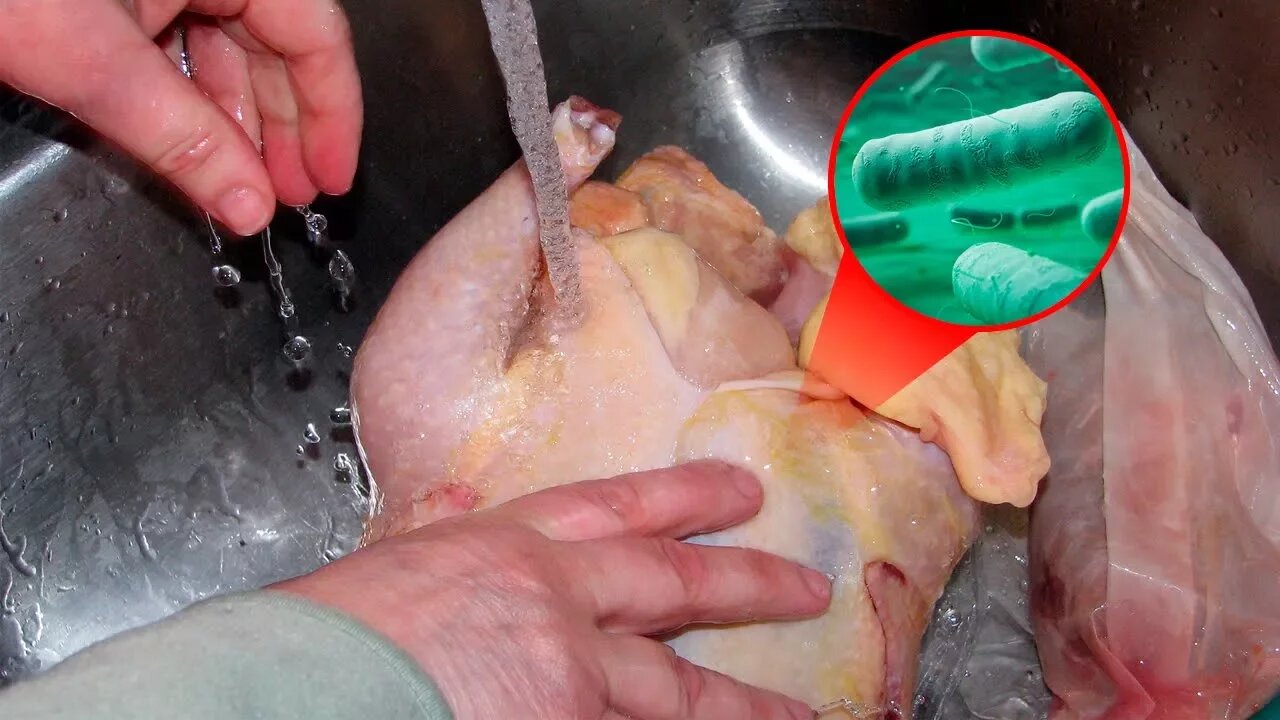Premium Only Content

This Is Why You Should Never Wash Raw Chicken Before Cooking It!
Do you normally wash your chicken before you cook it? A study shows that 90% of American housewives and cooks wash their chicken before cooking.
This may seem harmless, but it actually has several health risks.
Chicken is extremely rich in proteins, vitamins, and minerals. It’s also moist and full of water. These characteristics provide the perfect environment for microorganisms to develop, if the meat isn't conserved and handled in impeccably clean conditions.
According to scientists at Drexel University, when we wash chicken in the sink, we might be contaminating the whole area. Water can splash off the chicken, up to 20 inches away in any direction.
These splashes of water can carry bacteria, and may land on clean dishes drying in the dish drainer, or on nearby food and contaminate them. Raw chicken can carry two very common bacteria: salmonella and campylobacter, which may have many consequences, from diarrhea to the development of an autoimmune system disease.
According to several published studies, 47% of people who wash their chicken are affected in one way or another by these bacteria. It’s important to remember that the bacteria present in raw chicken will be eliminated when you cook it. However, if the bacteria is in the sink, it won't.
This is such a serious subject that two colleges in the United States started a campaign called “don't wash your chicken.” In order to avoid contamination, anytime you are going to prepare raw foods (vegetables, beef, chicken or fish), move any food that is ready to eat or clean dishes away from that area. After touching the foods, disinfect the affected area with hot water.
Source(s):
http://drexel.edu/dontwashyourchicken/
https://www.food.gov.uk/news-updates/campaigns/campylobacter/fsw-2014
----------------------------------------
Facebook: https://bit.ly/38BWbw3
Pinterest: https://bit.ly/2Irvwa6
Disclaimer: The materials and the information contained on Natural Cures channel are provided for general and educational purposes only and do not constitute any legal, medical or other professional advice on any subject matter. These statements have not been evaluated by the FDA and are not intended to diagnose, treat or cure any disease. Always seek the advice of your physician or other qualified health provider prior to starting any new diet or treatment and with any questions you may have regarding a medical condition. If you have or suspect that you have a medical problem, promptly contact your health care provider.
-
 4:11
4:11
Natural Cures
1 year ago $1.19 earned7 Proven Foods to Unclog Arteries Naturally
4.76K3 -
 1:17:43
1:17:43
Michael Franzese
2 hours agoMy Daughters CONFRONTED Me About Being a Mobster Dad
28.2K2 -
 24:02
24:02
Kimberly Guilfoyle
5 hours agoCartel Strikes: Breaking News Coverage! | Ep.251
30.4K11 -
 1:01:36
1:01:36
Sarah Westall
3 hours agoBlackrock & the WEF Collaborate for World Dominance, Free Agency with AI w/ Reinette Senum
29K6 -
 3:08
3:08
Michael Heaver
14 hours agoOutraged UK Sends EMPHATIC Message
15.9K8 -
 1:20:15
1:20:15
vivafrei
5 hours agoRFK Jr. Takes on the Pharma WHOORES! Toddler-Assaulter Granted BAIL? COMPLYE WITH CRIMINALS! & more
116K72 -

LadyDesireeMusic
4 hours ago $1.51 earnedLive Piano Request - Anti Brain Rot - Support Culture Shift
20K1 -
 LIVE
LIVE
LFA TV
12 hours agoLFA TV ALL DAY STREAM - THURSDAY 9/4/25
831 watching -
 13:43
13:43
The Kevin Trudeau Show Limitless
1 day agoClassified File 3 | Kevin Trudeau EXPOSES Secret Society Brainwave Training
81.6K11 -
 1:09:23
1:09:23
The HotSeat
4 hours agoTrump’s Parade = Mocked, China’s Parade = Praised: Leftist Hypocrisy EXPOSED
22.1K6